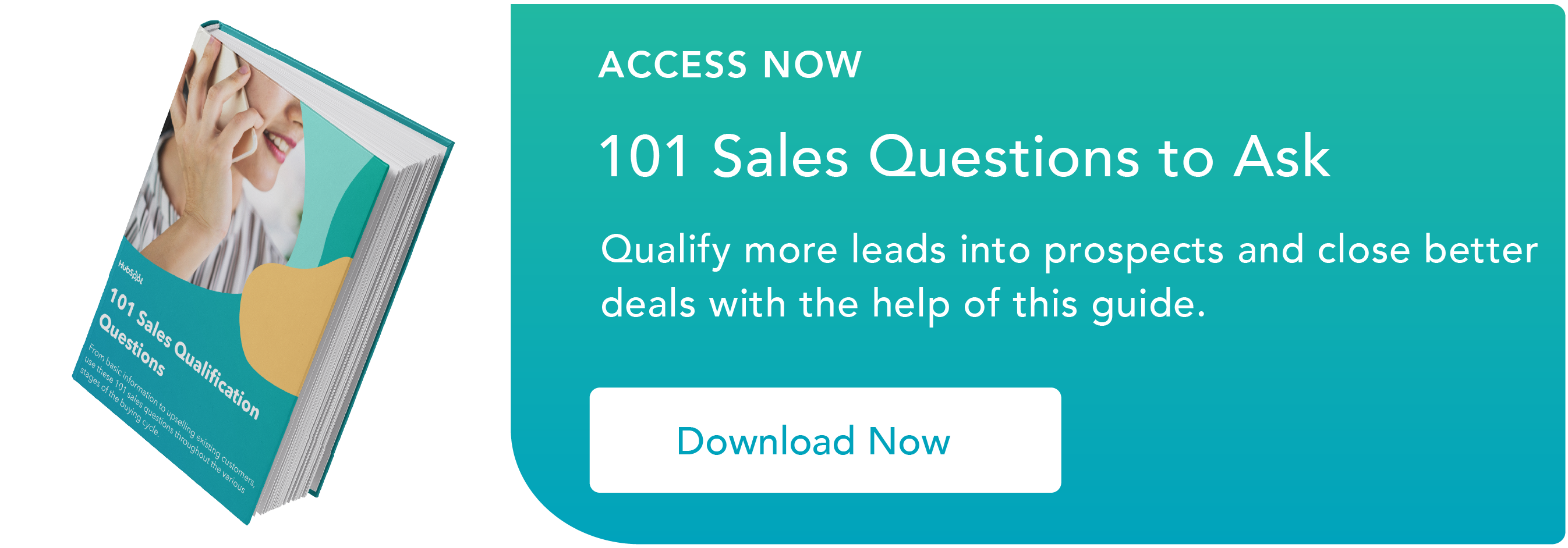Probing Questions
- “I've heard [insert relevant industry trend]. Is that affecting your business at all?”
- "Your website lists X,Y, and Z as company priorities, is that still the case?"
- "I've seen [breaking news] about your company. How are you doing?"
- "That's an interesting question, and one I'm happy to answer. Can we set it aside for a moment as we continue to explore your current energy situation?"
- "Oh, you were recently in Vegas? That's great! Now, last call, you were telling me about [business problem. Can we continue that conversation?"

The seller who asks the right questions guides the sale and wins the deal. Of course, you’ve got to be good at the fundamental questions to understand the customer’s current situation and the problems they want to solve.
But, it’s the probing questions that separate the experts from the novices -- and earn you more money.
Probing questions establish you as a partner in your buyer’s decision and set the stage for your future as a vendor of choice for many years to come.
Done well, probing questions dig into the buyer’s pain without embarrassing them for having that pain. Good questions reveal the full range of implications a problem has on a prospect’s business, personal career success, and ability to meet goals. These are the problems that truly matter and, most importantly, what that they’ll spend money to fix.
Sales Probing Questions Mistakes
- The C-Suite Mistake
- The Dog-Ate-My-Homework Mistake
- The Misdirected Question Mistake
- The #TooSoon Mistake
- The TMI Mistake
But, remember, probing questions can go horribly wrong. Used poorly they’ ll derail your conversation or lose the deal altogether.
Here are five common mistakes reps make when asking probing questions and what to do instead.

Image source: Giphy
1. The C-Suite Mistake
Most of the C-suites, presidents, and owners I’ve known share one characteristic: They like to be right. They also like to appear as if they know everything there is to know about their company, their industry, and their people.
This is why, when selling to executives, almost any question starting with, “Did you know ...” is a terrible, horrible, no-good, very-bad idea.
Think about it.
If you say to an airline exec, “Did you know oil and gas prices are up 26% and BLUESTAR Airlines is crushing it because they bought 15-years’ worth of futures five years ago at historically low prices?”
If they say “Yes,” now what?
You’ve either embarrassed them for making a business blunder, or you’ve forced them to lie because it would be embarrassing to admit they didn’t know.
And what if they say “No?” What have you won? You’ve either embarrassed them in front of others or you appear to be jockeying for a conversational power position.
None of these are good outcomes. Instead, try questions like:
“Mr. CEO, the airlines I’m talking to tell me BLUESTAR has become more competitive than usual because of the oil futures they locked in a few years ago. With oil and gas prices up 26%, how is that affecting your marketing or operational strategies?”
See what you did there? You gave them an opportunity to either:
- Debunk your theory and tell you their real problem
- Agree wholeheartedly by saying, “Yes, they pulled a smart trick -- we’d love to figure out a way to compete.”
- Say, “Really? That’s what others are worried about. Ha! We’ve got that figured out in spades! What we need to solve is …”
Either way, you’re now a confidante and expert -- and you’re at the table!

Image source: Giphy
2. The “Dog-Ate-My-Homework” or “I-Skipped-Ahead-Two-Chapters” Mistake
The homework mistake presents two faces. Either you didn’t do your homework and you ask a probing question that takes you down a black hole to hell. Or you did too much homework and come off as a know-it-all who actually knows nothing about what they’re dealing with.
Both are equally dangerous.
It’s wise to do some homework before any sales meeting. At the very least, you should look everyone up on LinkedIn, check their company website, and maybe even discover the blogs they write. These are the basics.
But, please-oh-please, before you start the meeting -- do a quick Google search on “[Company name] news.”
I can’t tell you how many times I’ve had a meeting with big company mucky-mucks the day after a huge merger, stock downgrade, or game-changing event was announced. These events are critical for me to be aware of.
Imagine if you walked into SpaceX the day after Elon Musk’s Tesla convertible successfully launched towards its orbit around Mars and you didn’t even know it had happened. Within seconds -- no matter what you’ve prepared -- you’ll be cast as an outsider not in touch with your prospect’s highest priorities.
When big things happen -- the world shifts on its axis for your buyer. Priorities re-arrange. They’re either more optimistic about the future and ready to try new things or they’re scared and need new things to make that fear go away. Both are opportunities, but if you don’t know about them, you’re dead in the water and will look like a fool.
On the other hand, over-preparing can equally bruise your ability to sell.
When was the last time your company updated their website or you updated your LinkedIn profile? Making assumptions about what the company is doing or the challenges they face, based on these assets, is likely to send you down a tunnel with no cheese.
It’s like that pesky know-it-all kid who read ahead in Geometry class but got the theories all wrong because they didn’t do the work to understand the principles behind the proofs. When they got up to the board to show off their skills, they were mortally embarrassed -- and you will be too if you make assumptions you haven’t checked with your buyer.
Educate yourself enough so you don’t ask about things you could’ve easily discovered if you’d just taken a moment. Then, build smart questions that help you get to the problems your buyers currently need to solve.
3. The Misdirected Question Mistake
Every moment you spend with your buyer is precious real estate.
Consider how difficult it is to get a buyer to re-engage after you’ve left a meeting -- it’s tough, right? While you have their attention, use your time wisely. If you’re asking a probing question – be sure you know why you’re asking and what the answer will provide in the sales process.
For example, if you are selling a SaaS solution helping customer predict the amount of energy their manufacturing plants will use this year so they can more accurately budget for operational expenses, don’t ask your buyer about their career path and how they came to work at their current company.
Your buyer will answer the question, and now you’re down a rabbit hole discussion of career choices. How will you bring the conversation back to your solution?
You should use this same thinking when your customer asks you a question. If you know you’re starting down a bad path, simply say “That’s an interesting question and I’m happy to answer it. Can we set it aside for a moment as we continue to explore your current energy situation?” Be courteous and respectful, but remember, it’s your job to keep the conversation on track.

Image source: Giphy
4. The #TooSoon Mistake
Sometimes, you’ll be talking with a customer because something negative just happened in their company or their industry, and your solution might help your customer deal with that change.
Tread cautiously.
You have no idea how the event personally or professionally impacted your buyer. They might have lost a mentor in a downsizing or budget that leaves their job in jeopardy. If your line of questioning assumes you know what they are dealing with -- you’re likely to put your foot in your mouth or shut the conversation down altogether.
Of course, it’s important to address the pain your buyer is experiencing so you can help with your solution. But it’s best to let them bring up difficult stories and paint the picture for you.
Refer to the event in broad strokes. “Well, Laura, I’ve been hearing a lot about your company in the news lately. How are you doing?”
Never make assumptions about the impact or how your targeted prospect wants to solve their problem before you’ve given them the opportunity to dig in. Take their lead. It might just be too soon for them to talk about or deal with it.
The same goes for recent news about competitive situations. Imagine meeting with someone at Lyft and saying something like: “Wow. Looks like Uber is really hurting. Boy, Travis Kalanick messed that one up.” Just to have your prospect respond…”Oh really? He was in my fraternity in college.” You’re not going to recover from that one, I promise.
5. The TMI Mistake
Your buyer tells you she just got back from a big convention in Vegas. This is absolutely not the time to ask questions like “Did you make it to the Mustang Ranch while you were out there?” Or “How much did you lose at the tables?”
These are likely exaggerations of too much information (TMI) questions you want to avoid.
It’s not unusual for buyers to share things going on in their life that have nothing to do with the sales conversation.
Be professional. Do you really need to know what crazy shenanigans went down at their 14-year-old’s birthday party? Do you really need to know their favorite part of the Universal Studios tour? Is it really important to know which bar they hung out at when they last visited New Orleans?
No. You don’t need to know that stuff. At the best, you’ll have spent precious selling time on conversations that don’t matter, and at the very worst, the question will backfire and you’ll get an answer you don’t know how to handle or it will shut down the conversation entirely.
A better approach is to simply acknowledge the statement with a simple, “Oh, great!” and save the probing questions for the answers that will help you get the deal.
Your Turn
So, now it’s your turn. What probing questions have you learned to avoid and what are you doing instead? Happy Selling!
![Free Download: 101 Sales Qualification Questions [Access Now]](https://no-cache.hubspot.com/cta/default/53/e97d6603-b40e-4085-ad55-0074b7351ead.png)







![Confused About I.E. vs. E.G.? When to Use Each [With Examples]](https://blog.hubspot.com/hubfs/ie-vs-eg-fi%20%281%29.jpg)


